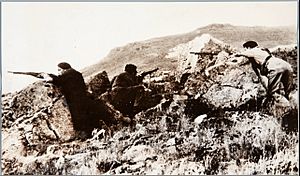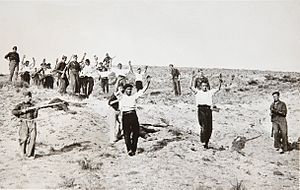Battle of Guadarrama facts for kids
Quick facts for kids Battle of Guadarrama |
|||||||
|---|---|---|---|---|---|---|---|
| Part of the Spanish Civil War | |||||||
 Republican soldiers and militiamen in the mountains of Navacerrada, 1936 |
|||||||
|
|||||||
| Belligerents | |||||||
| Commanders and leaders | |||||||
| Units involved | |||||||
|
|
|||||||
| Strength | |||||||
| At least 1 Bréguet 19 | |||||||
The Battle of Guadarrama (also called Batalla de Somosierra) was one of the first big fights in the Spanish Civil War. It happened in the Guadarrama Range mountains. This battle took place from late July to early August 1936.
The Nationalist side, led by General Mola, wanted to cross these mountains. Their goal was to reach Madrid, the capital, from the north. But the Republican side, made up of regular soldiers and volunteer fighters called militiamen, left Madrid to stop them. The Republicans succeeded in defending the mountain passes. This meant the Nationalist troops could not get through to Madrid.
Contents
Why the Battle of Guadarrama Happened
General Emilio Mola was a key leader in the military uprising. This uprising aimed to overthrow the Popular Front government. Mola planned for different army groups to rise up at the same time.
He knew it would be hard for the uprising to succeed in Madrid alone. So, Mola planned to lead an army group from the north to help. If that failed, General Franco would bring troops from Morocco. These troops would then advance on Madrid from the south and west.
How the Battle Unfolded
On July 19, General Mola took control of Navarre. He then sent Colonel García Escámez south. This group was meant to help the uprising in Guadalajara. However, they learned that the uprising in Guadalajara had already failed. Government forces from Madrid were in control there.
Colonel García Escámez then decided to go to the Somosierra mountain pass. This pass was important for reaching Madrid from the north. He met a group of royalists from Madrid who were already defending the area. By July 22, Escámez's group had secured control of the Somosierra pass. This was a vital step for the Nationalists.
Another rebel group, led by Colonel Serrador, left Valladolid on July 21. Their mission was to take another important pass, Alto del León. When they arrived, Republican militiamen from Madrid had already taken it. But Serrador's group managed to push them out. By July 25, Alto del León was also under Nationalist control.
Neither Escámez nor Serrador could advance further towards Madrid. They were running low on ammunition. They had to dig in and prepare to defend their positions. Their situation was difficult until General Franco sent them more ammunition.
A government group, led by Colonel Mangada, left Madrid. They headed towards Ávila. Their goal was to cut off the rebel forces at Alto del León from behind. Mangada's group took several towns where the local police had joined the uprising. But they stopped at Navalperal de Pinares. Mangada was worried about losing contact with Madrid.
Who Fought in Guadarrama
The Republican forces trying to push the rebels out of Somosierra were led by brothers Francisco Galán and José María Galán. They were lieutenants in the police forces. Important leaders from Madrid's CNT (a workers' union) like Cipriano Mera also joined. Captain González Gil formed a group called the "October" Battalion.
The idea to have professional officers lead the volunteer groups came from General José Riquelme. He was in charge of the troops in Madrid.
One of the most famous Republican groups was the Fifth Regiment. This group was organized by the Communist Party of Spain. It was set up like the Red Army in Russia. They had political officers who explained why they were fighting. The Italian communist Vittorio Vidali helped inspire this group. Its first leader was Enrique Castro Delgado. Another well-known communist fighter was Valentín González "El Campesino."
The Republican side had some advantages in the Battle of Guadarrama. They had more artillery and air power. It was also easy for them to get supplies because Madrid was close. By August, about 40,000 militiamen were organized into groups. These groups had names like "Paris Commune" or "October 1st."
However, the Republican government had ordered the regular army units to break up. This was to stop the uprising. So, the Republic could not fully rely on trained military units. There were also often disagreements between the volunteer leaders and the professional military officers.
What Happened After the Battle
The fighting was very intense. Both sides captured and executed prisoners.
It is hard to know exactly how many people died. But it was less than 5,000. Many Republican officers were killed. These included Captains Condés, Fontán Cadarso, and González Gil. On the rebel side, a leader named Onésimo Redondo was killed. He died in a meeting in Labajos when some Republican fighters got behind the front lines.
In May 1937, the Republicans tried another attack called the Segovia Offensive. But this attempt failed quickly. For the rest of the war, the front lines in this area stayed mostly the same. The war ended in March 1939 with a victory for the Nationalist rebels.
See also
 In Spanish: Batalla de Guadarrama para niños
In Spanish: Batalla de Guadarrama para niños
- List of Spanish Nationalist military equipment of the Spanish Civil War
- List of Spanish Republican military equipment of the Spanish Civil War
- Fifth Regiment
 | Jackie Robinson |
 | Jack Johnson |
 | Althea Gibson |
 | Arthur Ashe |
 | Muhammad Ali |


